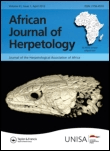
AFRICAN JOURNAL OF HERPETOLOGY
Scope & Guideline
Cultivating a Global Community for Herpetology Enthusiasts
Introduction
Aims and Scopes
- Biodiversity and Taxonomy:
The journal emphasizes the documentation and classification of herpetological species, including descriptions of new species and taxonomic revisions, which are crucial for understanding biodiversity. - Ecology and Behavior:
Research often focuses on the ecological interactions, habitat preferences, and behavioral adaptations of amphibians and reptiles, contributing to the understanding of their roles within ecosystems. - Conservation and Threat Assessment:
A significant portion of the journal's articles addresses conservation issues, including population assessments, the impacts of habitat loss, climate change, and the effectiveness of conservation strategies. - Genetics and Phylogeography:
Studies on population genetics and phylogeography are common, providing insights into evolutionary relationships and genetic diversity among herpetofauna. - Human-Animal Interactions:
Research exploring the interactions between humans and herpetofauna, including ethnomedicine and the impacts of human activities on species, highlights the socio-cultural dimensions of herpetology.
Trending and Emerging
- Climate Change Impact Studies:
There is a growing emphasis on assessing the vulnerability of herpetofauna to climate change, indicating a recognition of the urgent need to understand how these species are affected by shifting environmental conditions. - Conservation Genetics:
Research focusing on genetic diversity and conservation genetics is trending, highlighting the importance of genetic data in informing conservation strategies and management practices. - Community Science and Citizen Engagement:
The use of community science, including photographic and videographic data collection, is emerging as a valuable tool for herpetological research, enabling broader participation and data collection across vast geographic areas. - Health and Disease Studies:
Increasing attention is being given to the health of herpetological species, particularly in relation to disease dynamics, such as chytridiomycosis, and their implications for conservation. - Ecological Niche Modeling:
Ecological niche modeling is becoming more prevalent, providing predictive insights into species distributions and habitat preferences, which are critical for effective conservation planning.
Declining or Waning
- Traditional Taxonomy:
There appears to be a decreasing focus on purely traditional taxonomic studies, as more research emphasizes integrative approaches that combine genetic, morphological, and ecological data. - In-depth Morphological Studies:
While morphology remains important, in-depth examinations of morphological traits are becoming less frequent as researchers increasingly rely on molecular techniques for species identification and classification. - General Surveys without Specific Focus:
General surveys of herpetofauna without specific ecological or conservation implications seem to be less common, as the journal increasingly prioritizes studies that address urgent conservation issues or provide detailed ecological insights.
Similar Journals
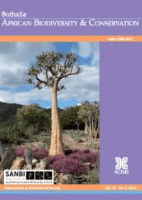
BOTHALIA
Championing the science of ecology and evolution.BOTHALIA is a prominent open-access journal dedicated to advancing the fields of Ecology, Evolution, Behavior, and Systematics, as well as Plant Science. Published by the South African National Biodiversity Institute (SANBI), this journal has been disseminating valuable research since 1978 and has embraced open access since 2014 to enhance the visibility and accessibility of scientific knowledge. With an ISSN of 0006-8241 and E-ISSN of 2311-9284, BOTHALIA plays a pivotal role in promoting biodiversity research in South Africa and beyond. In the recent Scopus rankings, it has been positioned at Q4 in both relevant categories, highlighting its contributions within the broader scientific community, despite being in its growing phase amidst competitive rankings. The journal aims to publish high-quality articles that address critical issues in biodiversity and ecological sciences, making it an essential resource for researchers, professionals, and students committed to understanding and managing our planet's biological heritage.
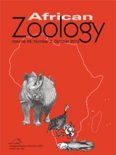
AFRICAN ZOOLOGY
Illuminating the Path of Zoological DiscoveryAFRICAN ZOOLOGY, published by Taylor & Francis Ltd, stands as a significant journal in the realm of Animal Science and Zoology, with a proud history dating back to 1996 and slated to continue until 2024. With an ISSN of 1562-7020 and E-ISSN 2224-073X, this journal provides a reputable platform for researchers and practitioners dedicated to the study of animal biology across the African continent. It has been recognized for its quality scholarship, evidenced by its Q3 categorization in the 2023 Scopus quartile rankings and an impressive rank of #182 out of 490 within its field. As an open-access journal, it facilitates the dissemination of vital research findings and promotes broader accessibility, catering to a diverse audience of professionals, scholars, and students alike. The journal aims to enhance our understanding of wildlife, conservation, and ecosystem dynamics in Africa, fostering collaborations that address critical ecological challenges. For researchers and enthusiasts keen on contributing to and staying informed about advancements in zoological science, AFRICAN ZOOLOGY is an essential resource that enriches the global discourse on biodiversity and conservation efforts.

AMPHIBIA-REPTILIA
Pioneering Discoveries in Zoology and EcologyAMPHIBIA-REPTILIA, published by BRILL, stands as a prominent journal in the field of zoology and ecology, specializing in herpetology, the study of amphibians and reptiles. With a rich history since its inception in 1980, this journal aims to disseminate high-quality, peer-reviewed research that advances our understanding of these vital vertebrate groups. Holding a commendable 2023 Q2 ranking in both Animal Science and Zoology and Ecology, Evolution, Behavior and Systematics, it is recognized for its contributions to the scientific community. Researchers are encouraged to submit their manuscripts, benefiting from the journal's commitment to academic excellence, which is showcased in its operational transparency and rigorous editorial process. Though currently not open access, the journal's findings are pivotal for advancing conservation efforts and ecological studies, making it an essential resource for scholars, professionals, and students invested in these important fields.

Acta Herpetologica
Empowering Research, Enriching ConservationActa Herpetologica, published by FIRENZE UNIV PRESS, is a reputable Open Access journal dedicated to the field of herpetology, encompassing research on amphibians and reptiles. Established with the aim to foster scientific discourse, this journal has made its content freely accessible since 2006, enabling researchers, professionals, and students to engage with a diverse array of studies and findings. As of 2023, the journal is categorized in Q3 of Animal Science and Zoology and ranks 357 out of 490 in the Scopus database, reflecting its contribution to the field and providing a platform for high-quality research. The journal showcases manuscripts that cover a wide range of topics, from ecology and conservation to physiology and evolution, supporting global efforts to understand and preserve herpetofauna. With a convergence period spanning from 2009 to 2024, Acta Herpetologica continues to be an essential resource for advancing academic knowledge and facilitating discussions in herpetological research.
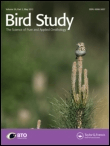
BIRD STUDY
Exploring the intricate world of birds and their ecosystems.BIRD STUDY, an esteemed journal published by Taylor & Francis Ltd, stands at the forefront of avian research, contributing significantly to the fields of ecology, evolution, behavior, and conservation. With its ISSN 0006-3657 and E-ISSN 1944-6705, this journal has been a cornerstone of ornithological studies since its inception in 1954 and continues to provide a critical platform for the dissemination of knowledge through 2024 and beyond. It holds a respectable Q3 quartile ranking in both Ecology, Evolution, Behavior and Systematics and Nature and Landscape Conservation, reflecting its pivotal role in the academic community. While the journal is not open access, it continues to attract submissions from a diverse array of researchers and professionals eager to share their findings on the intricate and dynamic interactions of birds within their ecosystems. As the global focus on biodiversity and conservation intensifies, BIRD STUDY remains dedicated to fostering knowledge and encouraging evidence-based practices that aim to protect avian species and their habitats.
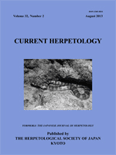
CURRENT HERPETOLOGY
Pioneering research in herpetology since 2000.CURRENT HERPETOLOGY is a leading journal dedicated to the study of reptiles and amphibians, published by the Herpetological Society of Japan in collaboration with the Graduate School of Science at Kyoto University. With its ISSN 1345-5834 and E-ISSN 1881-1019, this journal serves as a vital platform for sharing significant research findings in the field of herpetology. The journal has been continuously contributing to the scientific community since its inception in 2000, with a scope that embraces diverse topics including ecology, behavior, conservation, and physiology of herpetofauna. Recognized for its scholarly impact, CURRENT HERPETOLOGY holds a commendable position within the Q3 quartile in the Animal Science and Zoology category, ranking 350 out of 490 according to Scopus metrics. Although it is not currently an open-access journal, it caters to an audience comprising researchers, professionals, and students looking to deepen their understanding and engage with cutting-edge studies. Based in Japan, at the Department of Zoology in Kyoto, this journal is poised to foster advancements in herpetological research and promote global collaboration in this vital area of science.

Global Ecology and Conservation
Unlocking insights for a thriving planet.Global Ecology and Conservation, published by Elsevier, stands as a premier open-access journal dedicated to advancing the field of ecology and conservation science. Since its inception in 2014, the journal has facilitated the dissemination of high-quality research, fostering critical dialogue on ecosystem management, biodiversity preservation, and sustainability practices across the globe. With a remarkable ranking within the top quartiles (Q1) in various categories including Ecology, Evolution, Behavior and Systematics, and Nature and Landscape Conservation, it is positioned among the leading resources for researchers and professionals alike. The journal has garnered a notable impact, ranking #65 out of 721 in Ecology, and houses articles that are vital to understanding and addressing the pressing environmental challenges of our time. Available in an open-access format, researchers can freely access and share vital findings, promoting a collaborative approach to ecological research. Global Ecology and Conservation is not just a publication; it is a critical tool for innovation and advocacy in conservation, poised to inspire the next generation of environmental stewards.
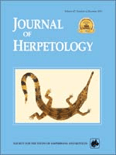
JOURNAL OF HERPETOLOGY
Fostering Knowledge in the World of HerpetofaunaJOURNAL OF HERPETOLOGY, published by the SOCIAL STUDY AMPHIBIANS REPTILES, is a premier platform dedicated to the advancement of knowledge in the field of herpetology, encompassing the study of amphibians and reptiles. With a dedicated ISSN of 0022-1511 and E-ISSN 1937-2418, this esteemed journal has been enriching the scientific community since its inception, with contributions spanning from 1980 to 1983 and from 1985 to 2024. As a notable entry in the Q3 category for both Animal Science and Zoology, as well as Ecology, Evolution, Behavior and Systematics in 2023, it maintains a competitive presence with a Scopus rank in the 40th and 33rd percentiles within its respective fields. Although it does not currently offer Open Access, the journal aims to foster a deeper understanding of the ecological and evolutionary dynamics of herpetofauna, making it an essential resource for researchers, professionals, and students alike. Whether you are exploring conservation strategies or evolutionary patterns, JOURNAL OF HERPETOLOGY remains a vital contributor to ongoing discussions and discoveries in the scientific exploration of reptiles and amphibians.
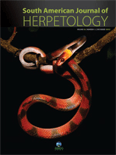
South American Journal of Herpetology
Highlighting critical reviews in amphibian and reptile science.South American Journal of Herpetology is a vital resource in the field of herpetology, published by the Sociedade Brasileira de Herpetologia. Established to advance the study of amphibians and reptiles, this journal aims to bridge the gap between regional science and global research. As an influential platform operating from Brazil, it serves as a forum for researchers, professionals, and students dedicated to understanding the rich diversity of South American herpetofauna. With a focus on innovative studies and critical reviews, the journal has been categorized in the Q3 quartile for both Animal Science and Zoology and Ecology, Evolution, Behavior and Systematics as of 2023, indicating a growing impact within these disciplines. Although currently not open access, it offers unique insights into the ecological and evolutionary aspects of herpetology, contributing significantly to discussions on conservation and biodiversity. The journal is housed at the prestigious Museu de Zoologia da Universidade de São Paulo, ensuring high academic standards and engagement with leading researchers in the field.
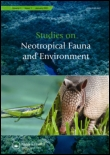
STUDIES ON NEOTROPICAL FAUNA AND ENVIRONMENT
Bridging Theory and Practice in Animal Science and EcologySTUDIES ON NEOTROPICAL FAUNA AND ENVIRONMENT is a distinguished academic journal published by Taylor & Francis Ltd, dedicated to advancing the fields of Animal Science, Zoology, and Ecology. With an ISSN of 0165-0521 and an E-ISSN of 1744-5140, this journal has been a significant outlet for scholarly research since its inception in 1976, continuing to provide critical insights into neotropical biodiversity and the environmental intricacies of this rich ecological region through 2024. Recognized in the Q3 category for both Animal Science and Ecology, the journal ranks at #232/490 in Animal Science and Zoology and #402/721 in Ecology, marking it as a valuable resource for researchers, professionals, and students interested in ecological and zoological studies. By offering a platform for innovative research and comprehensive reviews, the journal aims to bridge the gap between theory and practical application, facilitating a deeper understanding of the unique challenges and conservation strategies relevant to neotropical ecosystems. Although not an open-access journal, it plays a crucial role in fostering academic discourse and knowledge dissemination in its field, ensuring that critical advancements in understanding neotropical fauna and environmental dynamics reach a diverse and engaged audience.